Spying Across Borders in the Age of Email
by Rodrigo Ruiz and Rogério Winter
In times where the opponent was a state, as during the (((World War 2))), all efforts were made to ensure secure communication.
The Germans had the Enigma code, while the Allies came to use pigeons to cross the lines with vital information.
During the war itself, the Allies deciphered the German encryption machine, beginning a real obsession with how to decode ciphers of the opponents and, at the same time, create powerful ciphers for their own use.
The pigeons have been replaced by emails.
Today, instant messages are the most common form of communication between companies, individuals, and governments. Large distances are overcome with a simple click of the mouse, permitting all kinds of research in collaboration with colleagues around the world. But to what extent are we safe? In that fraction of a second between sending and receiving messages via email, who else will have access to them?
In response, service operators include guarantees within their contracts about user privacy, along with the use of SSL1 to protect communications.
The persona of the spy, popularized by James Bond - 007, is also associated with real-life versions of the National Security Agency (NSA) of the United States of America2, the CIA3, and the extinct KGB (FSB)4.
Meanwhile, the Edward Snowden case5 has resulted in geopolitical consequences for, as well as caused discomfort and financial damages among, former allies as evidence that espionage on a large scale is no longer limited to the declared enemy.
After 9/11, the game of espionage changed again. Fear changed the way of life around the world. Privacy and confidentiality are characteristics, which, when lost, result in financial losses and demand a considerable effort to regain them, although recovery is virtually impossible. This issue is well characterized by Bruce Schneier6.
Society has opened up its privacy in exchange for the promise of more security. Who decides which particular individual should be the focus of monitoring focus, and in what form? In January 2015, the magazine Science published a special issue titled "The End of Privacy."7
Large companies are often blamed for providing data on people and institutions indiscriminately to governments without appropriate legal actions. As there are no effective means of control, businesses and individuals essentially depend on the trust that people have in these large companies that hold records on us.
On the 11th of July 2013, the British newspaper The Guardian8 published the contents of TOP SECRET documents, showing that Microsoft works in conjunction with the NSA and the FBI, helping these agencies to circumvent new encryption procedures in its products, including Outlook.
Microsoft was given the right to reply by the newspaper:
"We have clear principles which guide the response across our entire company to government demands for customer information for both law enforcement and national security issues. First, we take our commitments to our customers and to compliance with applicable law very seriously, so we provide customer data only in response to legal processes."
The Game's Afoot
In January 2015, during a routine check, we found evidence that an email account linked to our research had been accessed without authorization. Despite our indignation towards this breach in our email security, rather than scare the hacker, we decided to exploit the situation and expand our knowledge of email privacy.
During the first months of 2015, email communications were made using controlled messages in order to protect the integrity of our research, while our curiosity about the hacker continued to increase.
By monitoring the situation, we obtained an Outlook access report (see Figure 1).
As can be seen in Table 1, IP address properties were established through consultations with ARIN9 and RIPE10 (see Figure 2).
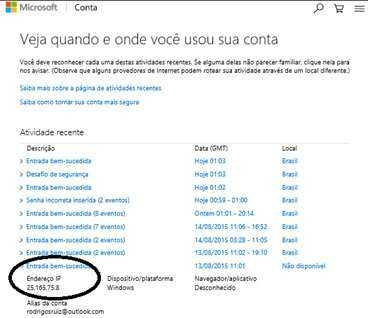
Figure 1: Microsoft Outlook access report and IP 25.165.75.8, which is the property of the U.K.'s Ministry of Defence.
|
Date/Time |
IP |
Owner |
Local |
|
15-01-2015 13:22 |
157.56.238.188 |
Microsoft Corporation |
Redmond |
|
29-01-2015 14:39 |
132.245.80.92 |
Microsoft Corporation |
Redmond |
|
02-02-2015 04:10 |
132.245.32.12 |
Microsoft Corporation |
Redmond |
|
02-02-2015 04:10 |
132.245.32.11 |
Microsoft Corporation |
Redmond |
|
03-02-2015 04:49 |
132.245.11.4 |
Microsoft Corporation |
Redmond |
|
03-02-2015 14:15 |
132.245.32.4 |
Microsoft Corporation |
Redmond |
|
09-02-2015 12:15 |
198.11.246.181 |
Softlayer/F-Secure |
Chantilly/Washington |
|
20-03-2015 10:41 |
25.163.90.11 |
Ministry of Defence, UK |
London |
|
20-03-2015 16:46 |
25.160.164.153 |
Ministry of Defence, UK |
London |
|
31-07-2015 20:04 |
25.165.74.23 |
Ministry of Defence, UK |
London |
|
13-08-2015 11:01 |
25.165.75.8 |
Ministry of Defence, UK |
London |
|
30-10-2015 09:24 |
25.165.118.133 |
Ministry of Defence, UK |
London |
|
27-11-2015 11:28 |
25.165.74.25 |
Ministry of Defence, UK |
London |
Table 1: List of IP addresses through which the email account was improperly accessed.
The password used to protect the account assigned at the time of the incidents was regarded as "strong," that is, it contained a great number of numbers, upper and lowercase letters, and special characters, which is a format typically used in IT (e.g. f5Gr$ekslanhjo).
It would be unthinkable that a corporation, which is one of the symbols of America, would be institutionally involved with an unfriendly foreign government.
During recent years, the entire world's media has regularly referred to the NSA in the context of any espionage action, control, and invasion of privacy against people, businesses, and governments around the world.
These reports have also shown that there is at least another player in the game - the U.K. - as seen in Figure 2, Figure 3, and Table 1.
The evidence, which is indisputable, points to actions of the U.K. in the USA, specifically in Microsoft.
In the search for an answer, we contacted the U.K.'s Ministry of Defence11, who were evasive in response, as can be seen in Figure 3.
When the U.K. government answers by saying, "We do not confirm and we do not deny," it alerts every privacy and security of the U.K.'s business, industrial, and scientific secrets.
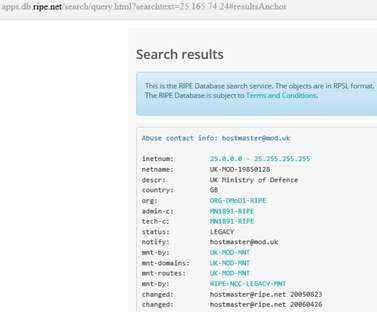
Figure 2: The RIPE Network Coordination Centre, the organization responsible for coordinating IP registries in Europe.
Assigns the range 25.0.0.0 to 25.255.255.255 to the U.K.'s Ministry of Defence.
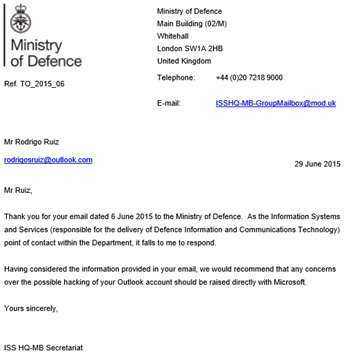
Figure 3: Response from the U.K.'s Ministry of Defence when asked if it authorized the intrusion into the researcher's email account,
or whether its own computers had been hacked by third-parties, thereby allowing access.
When questioned about these incidents, Microsoft12 provided the following protocols:
1076B89D 9023A4AE 4FB0DD02 B860A2E9 102FD43B |
On the 18th of December 2015, Microsoft Computer Emergency Response provided the reply as shown in Figure 4.
When Microsoft declared that the access simply involves a Microsoft server-to-server call, we might ask the following:
1.) Are Microsoft Outlook servers embedded in the U.K.'s Ministry of Defence infrastructure? If so, why?
2.) In Figure 6, we present an example of human interaction in Washington, D.C. in which a user typed in a wrong password a few days before London received access to the email account. Why would Microsoft imagine that an automated server system would type in wrong passwords?
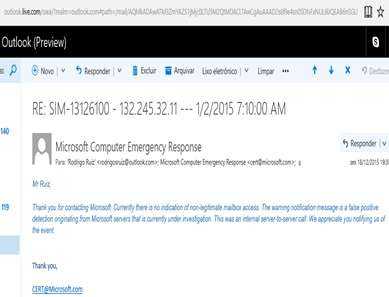
Figure 4: Microsoft's response that the incident in question is just a false positive with regard to its own server-to-server communications.
"Thank you for contacting Microsoft. Currently there is no indication of non-legitimate mailbox access. The warning notification message is a false positive detection originating from Microsoft servers that is currently under investigation. This was an internal server-to-server call. We appreciate you notifying us of the event."
This answer does not correspond to the information that Microsoft published on its site12 about the security and privacy of Outlook (seeFigures 5, Figure 6, and Figure 7).
On the same page, Microsoft says:
"When you tell us that you don't recognize an activity, it's possible that a hacker or a malicious user has gotten access to your account. To help protect your account, we'll walk you through several steps, including changing your password and reviewing and updating your security info."
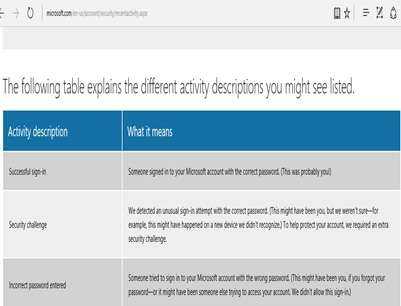
Figure 5: Microsoft describes on the user's page12 the different activities relating to an Outlook access report.
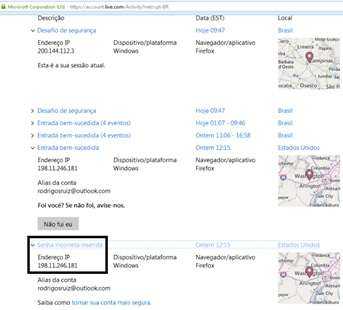
Figure 6: A wrong password was typed in by a human in Washington, D.C. a few days before London got access to the email account.
"Senha incorreta inserida" is Portuguese for "Wrong password typed."
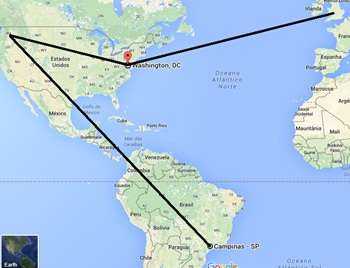
Figure 7: The way of shame, starting in Brazil, where the real user accessed their webmail and where the hacking took place in Microsoft.
Connecting in Washington, D.C., and finally arriving in London. Image from Google Maps.
More Questions Than Answers
What are the conditions that might have led to the U.K. becoming involved in this incident?
Or was the U.K. government also a victim, ashamed to admit that it had been hacked?
And did Microsoft fall prey to one of its employees?
What is the impact of this type of espionage in the world on researchers and the general public?
Are thousands of researchers vulnerable to the shady methods and almost unlimited resources of organized hackers?
How many patents are at risk?
Is the crime no longer about stealing, but simply getting caught?
The Los Angeles Times reported in 2001 that the relationship between scientific researchers and intelligence agencies did not cool off after the Cold War as previously thought. But, while these researchers continue to fully cooperate with their intelligence masters13, they should not forget that the same person who pays the wages of these scientists may also be reading their emails on a daily basis.
References
- ssl.com - What is SSL?
- nsa.gov - National Security Agency
- cia.gov - Central Intelligence Agency
- government.ru - The Russian Government
- MacAskill, Ewen and Dance, Gabriel - NSA Files: Decoded 11 November 2013
- Schneier, Bruce - "Securing Medical Research: A Cybersecurity Point of View" Science, Vol. 336, pp. 1527-1529, 22 June 2012
- American Association for the Advancement of Science - "The End of Privacy" Science, January 2015
- Greenwald, Glenn et al - "Microsoft Handed the NSA Access to Encrypted Messages" The Guardian, 12 July 2013
- American Registry for Internet Numbers
- RIPE Network Coordination Centre
- U.K. Ministry of Defence
- Microsoft - What is the Recent activity page?
- Gibbs, David N. - Academics and Spies: The Silence That Roars" Los Angeles Times, 28 January 2001
Acknowledgment
Thanks for all, 2600 team. Thanks to Kil Park and Fernando Amatte for research with us in crypto, privacy, and Apoc@lypse.
These surveys are catching the attention of the world.
Thank you for our wives who encourage us.